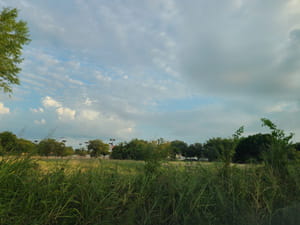|
|
|
|
|
|
 | S
|
UNT Achieves Record Growth in Research Productivity
Despite hurdles presented by the global pandemic, UNT set record growth in research productivity last year. Unprecedented gains in new research grants and proposals and overall research expenditures reflect the university's rise as a major national research university. The total number of research proposals rose 17% from $213 million in fiscal year 2020 to $251.4 million in fiscal year 2021, which ended Aug. 31. The university secured its highest-ever level of external funding, with a 25% increase from $39.9 million to $50.0 million in sponsored awards. UNT Vice President for Research and Innovation Mark McLellan said the record success was a testament to the tenacity and hard work of its research faculty who persevered while managing COVID-19 conditions, including reduced staffing and travel restrictions. Notable achievements include a $5.5 million grant from the Army Research Laboratory awarded to a team of researchers with UNT's Advanced Materials and Manufacturing Processes Institute and a prestigious Young Faculty Award from the Defense Advanced Research Projects Agency awarded to Ifana Mahbub, assistant professor of electrical engineering.
|
|
|
|
|
|
|
|
 Collaborating with City of Lewisville on Needed Park Collaborating with City of Lewisville on Needed Park
Through a park planning project between the city of Lewisville and UNT's Advanced Environmental Research Institute, Lauren Ames Fischer, assistant professor of public administration, together with students is helping to bring needed green space to the city. Fischer and Stacie Anaya, Lewisville parks and recreation director, teamed up to support the city's initiative to ensure every resident has a park within a 10-minute walk from where they live. This video discusses their process of conducting environment and land use analyses, monitoring air quality and identifying innovations in park development and design. In the coming year, they'll organize meetings and focus groups with the neighborhood residents to plan features for the park. Additionally, Lu Liang, assistant professor of geography and the environment, is studying the possible link between air pollution and heat in urban areas and has installed air quality sensors in Lewisville and throughout Denton County that will be providing data for the project. NBC recently featured both projects in a story about Climate Change and Inequality.
|
|
|
|
|
|
| Fulbright Awards |
UNT faculty members Shobhana Chelliah (pictured left), Distinguished Professor of linguistics and associate dean of research and development in the College of Information, and Julie Leventhal (pictured right), principal lecturer of educational psychology, have been named award winners in the prestigious Fulbright U.S. Scholar Program. Chelliah and Leventhal received their awards in 2020 but deferred their projects to this year due to the pandemic and will travel in February. Chelliah will head to India to provide training in language documentation and creation of archival-quality collections while Leventhal will go to Romania to teach and conduct research on anti-trafficking volunteerism at the University of Bucharest.
|
|
|
|
|
|
|
| Receiving 1,000th Publication Acceptance |
|
One thousand and counting. Bill Acree, professor of chemistry and undergraduate advisor, recently received acceptance of his 1,000th publication. Approximately 45% of his published articles were coauthored by graduate, undergraduate and high school students, including students in UNT's Texas Academy of Mathematics and Science and participants in the Upward Bound Math and Science Program who he has mentored over the years, both at UNT and Kent State University, where he taught before joining the UNT faculty in 1988.
|
|
|
|
|
|
|
| Transforming Biogas into Sustainable Products Using Bacteria |
|
How can we simultaneously mitigate and utilize greenhouse gases in a single, sustainable process? Calvin Henard, assistant professor of biological sciences, is studying how methanotrophic bacteria can convert methane gas into valuable products normally derived from petroleum. His work evaluating the role in methanotrophic bacteria of the enzyme RubisCO, which is responsible for the majority of carbon dioxide utilization on Earth, was recently published in the journal Applied and Environmental Microbiology. "It's a dual route to help the planet and have a sustainable bioeconomy," Henard says.
|
|
|
|
|
|
|
| Providing Better Blood Clotting Treatment |
|
Isolating proteins in zebrafish that could be manipulated to treat blood clotting disorders in humans more efficiently is the focus of biological sciences professor Pudur Jagadeeswaran's recent research. He believes a drug currently being used in cancer treatments could be a better treatment for deadly blood clotting disorders with few side effects. While there are a variety of drugs already on the market, many of them have side effects which can be inconvenient at best and dangerous at worst. "It is a balance," Jagadeeswaran says. "There is constantly a search for new drugs because of the complexity present in this particular problem."
|
|
|
|
|
|
|
| Three UNT Researchers Named Tech Titans Finalists |
|
UNT engineering researchers have been named finalists for two prestigious awards from Tech Titans, which showcase outstanding tech companies and individuals in North Texas. Narendra Dahotre, associate vice president for UNT's Center for Agile and Adaptive Additive Manufacturing, (pictured) is a finalist for the Technology Inventor Award, which recognizes the pioneering accomplishments for the creation of breakthrough ideas, processes or products. Computer Science and Engineering researchers Qing Yang and Song Fu, together, are finalists for the Tech Titans of the Future – University award, which recognizes educational institutions that encourage and support students in choosing engineering and technology-related disciplines as a preferred path.
|
|
|
|
|
|
|
| Advancing 3D Printing of Tissues and Organs |
|
Brian Meckes, assistant professor of biomedical engineering, recently received a grant from the National Institutes of Health to develop an advanced method of printing complex three-dimensional biological tissues, with potentially far-reaching impacts in medical research. Meckes believes he has discovered a method to create complex tissues with precise control over where individual cells are placed by using DNA technology to help the tissues align. The resulting technology could be used for new 3D-printed organ models that could speed up discovery of new therapeutics.
|
|
|
|
|
|